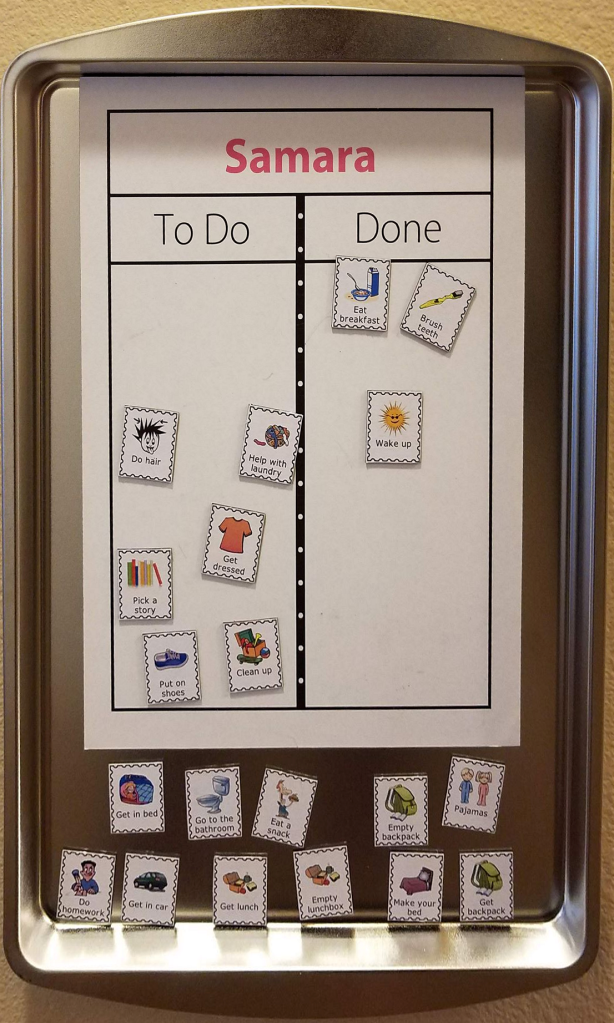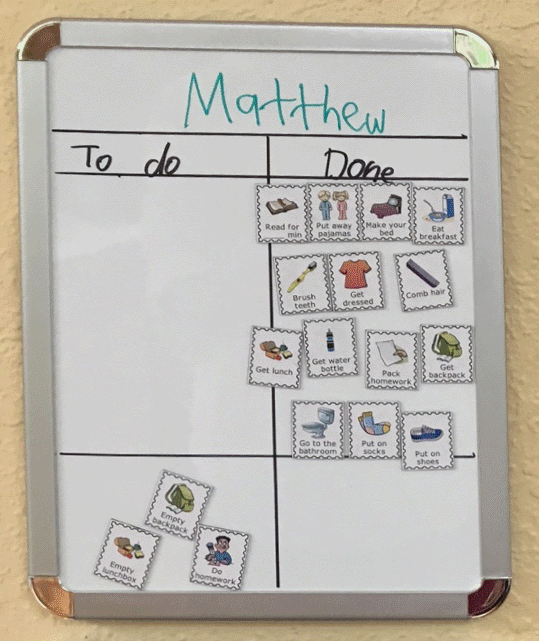The Trip Clip has lots of different ways to make chore charts that can grow and change with your kids. Here are 10 different types of chore charts that you can make with The Trip Clip.
1. Daily Chore Chart For an Individual Kid
The most straightforward chore chart is a simple list with checkboxes. This can be printed daily, laminated to use with a dry erase marker, or used as an interactive list on a phone or iPad. The Trip Clip lets you pick the chores you want to add to the list – you can add your own pictures and text, too.
Daily lists work especially well for younger kids, and may even include personal care tasks that aren’t exactly chores, but things each child will need to eventually learn to do independently – like brush their teeth every day!
2. Daily Chores With Moving Pieces
The Trip Clip also lets you turn a daily chore list into a reusable hook & loop or a magnetic chore chart with movable parts. If you purchase the supplies, you can create your own individual magnets and hook & loop clips by choosing from a big selection of pictures and writing your own text. You can also buy a pre-selected set of pictures you can print at home on Teacher Pay Teachers.
These are great for kids who need to visually see their completed tasks move from one side to the other.
For my kids the magnet chart on the fridge was the most successful, but we also had some luck with just printing a paper copy and taping it to the wall – they just looked at the list without bothering to mark things off (making it reusable), so it served as more of a reminder than as a way to track progress.
3. Weekly Chore Chart For an Individual Kid
You can also make a weekly chore chart that allows for different chores on different days of the week. Just like with the daily lists, the weekly list can also be laminated or used on a mobile phone.
I found this to be the most useful as my kids got older (late grade school and into middle school) and their after school schedule was busier. This let them visually see which days they had soccer or a lesson so they could plan homework time on the days that weren’t as full of other commitments. They also had more weekend chores at that age and this format let them track that too.
We also started to prefer to use the list on their phones as they got older. They always had their phones with them so they could check it from anywhere. It also worked great when changes came up mid-day while they were at school, or while I was at work. I could update their list from my computer and the changes would automatically show up on their phone so their list could always be up to date.
4. Chores For the Whole Family: Same Chores All Week
As your kids get older, you may want a chore chart that includes the whole family to help your kids understand that everyone in the house shares the work of keeping the household running. It can also be helpful to have the kids try different chores, and mine always liked having their responsibilities rotate a bit so if there was a chore they hated they weren’t stuck with it forever.
This first chart is one I created for my family when they were in middle and high school. It uses the daily list format shown with checkboxes on the left. I printed it in full page mode, on regular paper, and hung it on the fridge with magnets. Then I used the Print Your Own Magnets feature to make small magnets with each family member’s names on it. Each week (usually Sunday nights) we all took turns putting our name on the daily chores we wanted to be responsible for that week.
I also recently made a special layout for lists that can help show how chores are shared across the whole family. You can read more about sharing the load here.
5. Chores For the Whole Family: Different Chores On Different Days
After trying the chart above, we realized we wanted a little more variety over the course of the week. The chart below worked well for chores that need to be done every day of the week, but no one was stuck with the same chore every day of the week. We found this especially helpful for bigger chores like cooking dinner or walking the dog that were hard to do 7 days in a row.
I used the weekly-vertical format in full page mode to make this chart. This format puts the chores down the left side of the page, and the days of the week across the top. Again I used the “Print Your Own Magnets” feature to make magnets for each family member, and at the beginning of the week we took turns claiming the chores for that week. I just had one chore per person on this chart, but it’s easy to make it more chores than that by simply adding more chores to the left of the page. This format fits The Trip Clip’s small magnets well, so each of us picked a picture we liked as our ‘avatar’ just for fun, and we used those magnets to claim our chores.
6. Chores For the Whole Family: Less Frequent Chores
The next chore chart was how we handled tasks that needed to be done weekly instead of daily. We found it worked well to separate out these chores into a different chart from the list of daily chores. I made this using the weekly-horizontal layout and printed it in full page mode. I added each family member’s name to the left side of the page, and we took turns picking from the set of chores at the bottom. You can use the pre-printed chores pack for this, or print your own.
7. Chores BINGO
This isn’t a chart, but it’s a great way to get your kids to do some chores and keep it fun. Unlike daily assigned chores, chores bingo mixes it up a little, so kids try (and learn) different jobs. It works surprisingly well for spreading the work load and keeping it interesting.
There are many different ways that you can use the Chores Bingo board. An important way to start, though, is by making sure that you keep the chores age appropriate – this list from The Trip Clip is a great place to look for ideas (print it here):
Once you’ve made your Bingo board, there are a number of ways you can use it to keep your kids engaged and get those chores done!
- 5 in a line – ask them to pick 5 chores in a row or column to do over the course of a week. If they’re like my kids, they will do everything they can to optimize this and avoid doing the chores they hate, but you’ll still get some work out of them. The next week you can create a different BINGO board.
- Roll for it – have your kids roll two dice every day to determine which of the 25 chores they will do that day. The first dice tells you the row #, the second one tells you the column #. If either of the dice is a 6, treat it as a wild card – the child can choose! And two 3’s means they’re off the hook :).
- Family BINGO – challenge the whole family (parents included) to complete the board in a week. Every morning you take turns picking your chore for the day, and cross it off once it’s been chosen. By the end of the week, even the chores no one wants to do will get done. The kids especially like this one because they like it when the grownups have to do chores too.
- Pay for chores – it never hurts to bribe your kids a little, right? Offer them some money (a quarter? a dollar?) for each chore on the board they complete, and a bonus for finishing the whole board. Money is surprisingly motivating!
More Ideas From Customers
If you still need some more ideas about what kind of Chore Chart to make, here are some of the things other customers have done:
8. Hook & Loop Pet Care Chart
Heather made a hook & loop chart for taking care of the pets. With 3 teenagers in the house, she found it was hard to keep track of what animal care had and hadn’t been done yet. This way the chart helped keep the pet care communication visible for everyone to know the status!
9. Combined Daily & Weekly Chore Chart
Meghann made a chore chart that combined both daily and weekly chores into one. I love the creative way she used the binder clips to mark what chores had been completed and still keep the list reusable, with an extra binder clip on the right to mark the current day of the week! Very inventive.
10. Magnetic Whiteboard Chore Chart
Cindi used The Trip Clip Magnets on a magnetic whiteboard. This method is super flexible – she used extra space at the bottom to hold magnets she wouldn’t need every day. She also allowed her kids to do some personalizing/decorating of their whiteboards (not shown here).
The Trip Clip is very versatile, and will let you make many different kinds of charts to meet your family’s needs. If you make your own, send me a picture and I’ll include it here to share your good ideas with other parents!



















3 thoughts on “10 Chore Charts You Can Make With The Trip Clip”